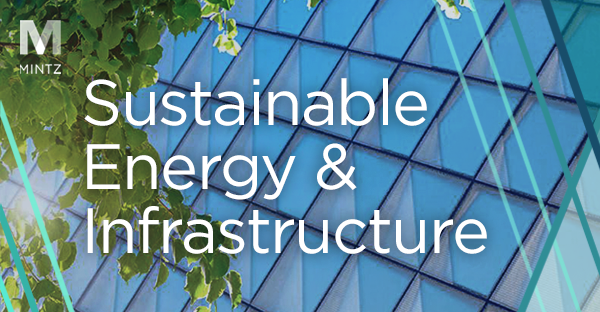Energy & Sustainability Washington Updates — February 2020
Congressional activity for January was primarily in the House of Representatives as the Senate conducted the impeachment trial of President Trump.
House Democrats Announce New Infrastructure Plan
House Democrats have unveiled a proposal to invest $760 billion over five years in the nation’s roads, bridges, transit systems, railways, airports, ports, inland waterways, wastewater and drinking water systems, brownfields, and broadband. The proposal commits federal funding for investments in alternative fuel infrastructure and carbon pollution reduction, encourages the use of energy efficient and water efficient technologies, and invests in transit and zero-emission buses to reduce greenhouse gas pollution, among other provisions. Specifically, the proposal calls for $34.3 billion in clean energy spending that invests in electric grid modernization, encourages communities to invest in energy efficient infrastructure, strengthens existing energy supply infrastructure, and supports the development of a charging network for electric vehicles. The Moving Forward Framework is available HERE, and a fact sheet is available HERE.
CLEAN Future Act
Democratic leadership at the House Energy & Commerce Committee on January 28 released the legislative text and a summary of the Climate Leadership and Environmental Action for our Nation’s (CLEAN) Future Act. According to the committee, the bill is “a comprehensive proposal of sector-specific and economy-wide solutions to address the climate crisis.” The bill sets a national goal for the United States to achieve a 100 percent clean economy by no later than 2050 and establishes a federal Clean Energy Standard. Included in the bill is language regarding energy storage systems, electricity infrastructure modernization and resilience, clean electricity generation, energy saving building codes, and existing building retrofits; provisions to promote energy efficiency including energy efficient government technology; and language encouraging energy savings performance contracts, among other provisions. The draft legislative text is available HERE, and a section-by-section summary is available HERE. A press release announcing the legislative framework is available HERE.
House Hearing on Carbon Capture Legislation
On February 6, the House Energy and Commerce Subcommittee on Environment and Climate Change will hold a hearing on the Utilizing Significant Emissions with Innovative Technologies (USE IT) Act (H.R. 1166). Reps. Peters (D-CA) and McKinley (R-WV) introduced the bipartisan bill last year. There are 57 bipartisan cosponsors. The bill authorizes $35 million in competitive prize funding for Direct Air Capture (DAC) technology and allocates $50 million toward research and development of technologies that transform captured carbon dioxide into commercial products. The bill also facilitates the construction and development of carbon capture, utilization and sequestration (CCUS) infrastructure projects, and promotes emerging net negative emissions technologies, particularly direct air capture technology, which prevents CO2 emissions by removing CO2 directly from the atmosphere. Sens. Barrasso (R-WY) and Whitehouse (D-RI) have introduced identical legislation in the Senate.
House Hearing on the Natural Gas Act
On February 5, the House Energy and Commerce Subcommittee on Energy held a hearing on “Modernizing the Natural Gas Act to Ensure it Works for Everyone.” In announcing the hearing, the chairs of the full committee and subcommittee, said, “The Natural Gas Act is nearly a century old, and it is past time that we take a comprehensive look at the Federal Energy Regulatory Commission’s implementation of it. We must reevaluate the pipeline siting process, which has long favored industry over the rights of landowners. We must also examine rates, charges, imports, exports, and what must be done to dramatically reduce impacts to our climate. It’s time to assess whether the Natural Gas Act is truly serving the needs and interests of all Americans, not just those of the gas industry.”
Other New Energy Legislation
January saw the introduction of several energy bills, including:
- H.R. 5650, the Federal Energy and Water Management Performance Act, introduced by Rep. Welch (D-VT) with three cosponsors. The bill amends the National Energy Conservation Policy Act to improve federal energy and water performance requirements for federal buildings and establish a Federal Energy Management Program.
- H.R. 5649, the Consumer Access to Grid Information Act, introduced by Rep. Porter (D-CA) with two cosponsors. The bill directs the Assistant Secretary of the Office of Energy Efficiency and Renewable Energy to establish a grant program to fund research and development with respect to certain cellular phone applications.
- H.R. 5615, The Residential Energy and Economic Savings (TREES) Act, introduced by Rep. Matsui (D-CA) with six cosponsors. The bill would establish a grant program to assist retail power providers with the establishment and operation of energy conservation programs using targeted residential tree-planting programs.
- H.R. 5558, the USA Electrify Forward Act, introduced by Rep. Dingell (D-MI) with no cosponsors. The bill promotes American leadership in vehicle manufacturing, job creation, improved air quality, and climate protection through domestic manufacturing of low- and zero-emission vehicles and the development of electric vehicle charging networks.
- H.R. 5554, the Clean Federal Fleet Act, introduced by Rep. DeSaulnier (D-CA) with one cosponsor. The bill would amend the Energy Policy Act of 1992 to ensure that vehicles in federal fleets comply with certain low greenhouse gas emission standards.
- H.R. 5545, the NO EXHAUST Act, introduced by Rep. Rush (D-IL) with four cosponsors. The bill is intended to promote the domestic manufacture and use of advanced, fuel-efficient vehicles, and zero-emission vehicles, encourage electrification of the transportation sector, create jobs, and improve air quality.
- H.R. 5527, the 21st Century Power Grid Act, introduced by Rep. Sarbanes (D-MD) with three cosponsors. The bill would require the Secretary of Energy to establish a program to provide financial assistance for projects relating to the modernization of the electric grid.
- H.R. 5518, a bill requiring the Secretary of Energy to carry out a Clean Cities Program, introduced by Rep. McEachin (D-VA) with no cosponsors. Under the program, the Department of Energy would make awards to clean city coalitions for projects and activities that reduce petroleum consumption, improve air quality, promote energy and economic security, and encourage deployment of a diverse domestic supply of alternative fuels in the transportation sector.


